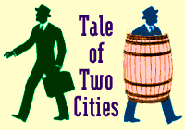|
POLITICS & COMMUNITY

by howard zinn
|
Are you delighted that the Dow Jones average has been going up, up, up? If so, you are part of that minority of Americans, that 10 percent of the population who (according to a report by the Joint Economic Committee of Congress) owns 90 percent of all stock. But what of all those other Americans who do not share in the wealth represented by a booming stock market?
In Charles Dickens' classic novel Hard Times, the main character is a pedantic, stiff-spined teacher named Gradgrind, who is consumed with admiration for "facts...nothing but facts."
Into Gradgrind's class enters Sissy Jupe, a poor mill girl who is befriended by Gradgrind's daughter Louisa, and who tells Louisa of a lesson given by Gradgrind: "And he said: 'In this nation there are fifty millions of money. Isn't this a prosperous nation, and an't you in a thriving state?'" Sissy Jupe continues: "I said I couldn't know whether it was a prosperous nation or not, and whether I was in a thriving state or not, unless I knew who had got the money and whether any of it was mine."
Indeed, in the United States today, the question is not whether the economy is "in a thriving state," or how large the Gross National Product is (seven trillions at latest count), but, as Sissy Jupe asked in her intelligent innocence: Who is benefiting from all of that? How much of that goes to ordinary Americans? Are not our urban centers really two cities, one of comfort, one of desperation?
For most Americans, the fact that the Dow Jones average has gone up 400 percent in the last 15 years is not as significant as the fact that the real wages of working people have gone down 15 percent in the same period.
|
Are not our urban centers really two cities, one of comfort, one of desperation?
|
In short, all those indicators that are pointed to as evidence that the economy is in good shape assume that what happens to "the economy" happens equally to everyone. We are therefore expected to exult, as one widely used high school textbook put it, in "the benefits of our country's free enterprise economic system." Our market economy is paraded as a magnificent success, to be duplicated happily by people all over the world.
But to bask in the glow of overall statistics about "the economy" is to deceive ourselves seriously about the realities of daily life for most Americans. I am not speaking only of the 15 million children living below the poverty level, nor the 40 million Americans without health insurance, nor only of the working poor who are barely above the poverty level. I am speaking of a large majority, that 80 percent of the population which has seen its income remain the same or decline over the past 15 years, while the richest 1 percent of the country gained a trillion dollars in tax breaks.
|
To bask in the glow of "the economy" is to deceive ourselves seriously about the realities of daily life for most Americans.
|
Felix Rohatyn, a senior partner in a Wall Street investment bank, gave a talk in 1995 in which he warned (was he thinking of the Great Crash and the turmoil of the Thirties?): "What is occurring is a huge transfer of wealth from lower skilled middle class American workers to the owners of capital assets and to a new technological aristocracy with a large element of compensation tied to stock values."
Sissy Jupe's acute insight is still not shared by our leading journals. A recent article in TIME magazine seemed not to understand that the word "consumer" applies differently to the rich than to the rest. Their correspondent wrote, in apparent puzzlement, "If American consumers are so worried about their jobs and armpit-deep in debt, why do Mont Blanc's five U.S. stores keep running out of their 888 Prince Regent pens, at $5900 a pop? And why does Chanel have a waiting list for its $2999 double-breasted tweed dresses?"
|
There may be a waiting list for Chanel dresses, but there is an even longer waiting list for jobs.
|
Yes, there may be a waiting list for Chanel dresses, but there is an even longer waiting list for jobs, health care, child care, and decent housing. If we, as a nation, are to find pride in our democracy, then we will have to ask the kind of questions that Sissy Jupe asked of Gradgrind. If the country has a great deal of money and is "in a thriving state," how much of this is spread, with some degree of economic justice, among all its people?
And if we decide that too many of our countrymen are not at all "in a thriving state," can we leave it to the wonders of the "free market," which historically has created wealth at the top, poverty at the bottom, and insecurity in the middle, to fulfill the American Dream? Is that dream not best expressed in the Declaration of Independence, which asserts the equal right of all to "life, liberty, and the pursuit of happiness"?
Howard Zinn is Professor Emeritus of Political Science at Boston University. He is the author of 14 books, including A People's History of the United States : 1492-Present, a retelling of American history from the point of view of the powerless and disenfranchised.
© 1996 Howard Zinn, All Rights Reserved.

|
